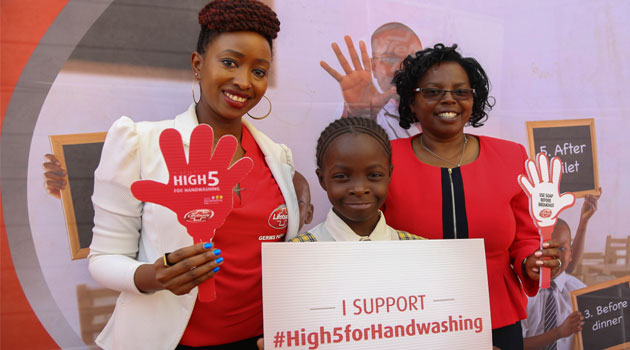
The 21-day intensive campaign seeks to raise awareness and change the hygiene habits of 12 million Kenyans by 2020, through the Lifebuoy Help a Child Reach 5 programme/FILE
NAIROBI, Kenya, Jun 22 – Unilever Kenya through its Lifebuoy brand, has kicked off an integrated behavioural change campaign to help reduce child mortality.
The 21-day intensive campaign seeks to raise awareness and change the hygiene habits of 12 million Kenyans by 2020, through the Lifebuoy Help a Child Reach 5 programme.
The programme seeks to foster a hand washing with antibacterial soaps culture as part of a continental programme aimed at encouraging behaviour change for more than 1billion people in Africa.
Speaking when she confirmed the launch of the campaign, Myriam Sidibe, Hygiene and Nutrition Social Mission Director Africa said the initiative has been inspired by available statistic indicating that more than 5.9million children under the age of 5 years died in 2015 due to several preventable causes including diarrhoea.
The Centre for Disease Control (CDC) while describing hand washing with a soap as a “do-it-yourself” vaccine notes that keeping hands clean through improved hand hygiene is one of the most important steps we can take to avoid getting sick and spreading germs to others. Many diseases and conditions are spread by not washing hands with soap and clean, running water.
According to the World Health Organization and UNICEF, Children in sub-Saharan Africa are more than 14 times more likely to die before the age of 5, than children in developed regions. More than half of these early child deaths are due to conditions that could be prevented or treated with access to simple, affordable interventions.
“Such grim statistics are a stark reminder that the local corporates have a role to play in raising awareness for interventions such as hand washing to reduce child mortality,” said Myriam.
To help deal with these maternal challenges, Lifebuoy has launched the second phase of the Lifebuoy School of 5 Programme targeting to reach 200,000 children between June and August 2017. Between February to April this year, the programme benefited over 200,000 school children who were celebrated during today’s event.
“Simple hygiene interventions can make a massive difference to this complex issue which in turn improves health and well-being of school going children,” said Carolyne Kendi Marketing Manager – Skin Cleansing EA.
Since 2010, Lifebuoy has reached more than 337 million people across 28 countries in Asia, Africa and Latin America to teach them healthy hand washing habits. Lifebuoy’s hand washing with soap behaviour change programme transforms the hygiene habits of new mothers, school children, caregivers and entire communities
The 21-Day intensive behaviour change program motivates students to practice the hand washing with soap behaviour during the 5 key daily occasions.
Carolyne further noted that the act of hand washing with soap is the most cost-effective way to save lives and stop new born deaths yet only 19% of the world’s population wash their hands with soap after using toilet facilities.
She says as of March 2016, access to hand washing facilities with soap has been recognised as an indicator to achieve UN Sustainable Development Goal 6 (ensure available and sustainable water and sanitation for all).
“Hand washing Changing behaviour takes consumer understanding and marketing expertise – and that’s where Lifebuoy soap steps in. With soap is proven to reduce diarrhoea disease by up to 45% and pneumonia by 23%,” added Carolyne.
Carolyne added that despite numerous traditions being followed for an auspicious start to a newborn’s life, sadly, the simplest practice of hand washing is not taken seriously, putting babies at life-threatening risk.

































